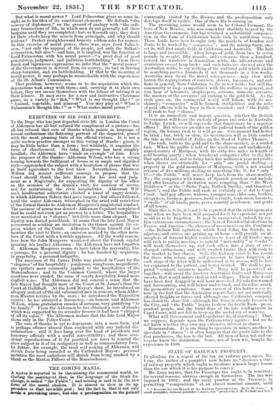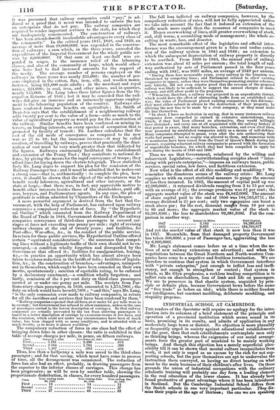STATE OF RAILWAY PROPERTY.
IN pleading for a repeal of the tax on railway passengers, Mr. Lang, the author of a pamphlet now before us, discloses a state of railway property which ought to inculcate a much larger lesson than the one which it is his purpose to convey.
Mr. Lang argues, that the Passenger-tax ought to be remitted ; for several reasons, obvious enough in themselves. The tax was imposed in 1832; and the early practice of the Treasury, in permitting " compositions " at an almost nominal amount, until
• " Reasons for the Repeal of the Railway Passenger-tax. By G. H. Lang." A small pamphlet, without publisher's name, but " printed by .L B. Nichols and Son." it was presumed that railway companies could "pay," is ad- duced as a proof that it never was intended to enforce the tax on enterprises that do not pay. The railway companies are required to render important services to the state, for which they are inadequately remunerated. The construction of railways "has been attendedwith incalculable advantages to every class of the community." In the critical years 1817, 1848, and 1849, an average of more than 28,000,0001. was expended in the construc- tion of railways; a sum which, in the three years, exceeded the
terests, on trading interests, on every species of occupation that is promoted by facility of transit: Dr. Lardner calculates that the cost of the old mode of conveyance as compared to the new was as 27 to 10; but the immense increase—it may be called creation, of travelling by railways, proves that practically the dimi- nution of cost must be very much greater than that indicated by the figures. Railways enormously facilitated the establishment and extension of the Penny Post ; they contribute to national de- fence, by giving the means for the rapid conveyance of troops ; they afford lines for laying down the electric telegraph. These statistical facts Mr. Lang urges to support his plea for the remission of the Railway Passenger-tax ; and it must be admitted that he makes out a strong case—that is, arithmetically : to complete the plea, how- ever, it should be shown that the object of the adventurers was to benefit needy labourers, agricultural and other interests, or the state at large,—that there was, in fact, any appreciable motive to benefit other interests besides those of the shareholders, paid offi- cers, lawyers, and Parliamentary agents. In any case, the plea of gratitude is seldom admitted by Chancellors of the Exchequer. A more powerful argument is derived from the fact that Go- vernment, with the help of Parliament, has enforced upon railway companies a compulsory reduction of fares. By "the Hypotheti- cal Outline" which emanated from the Railway Department of the Board of Trade in 1844, Government demanded of the railway companies conveyance of third-class passengers in covered ear- ' es at fares not exceeding one penny per mile ; right of revising
way charges at the end of twenty years ; and facilities, for Post-office, 1Var.office, &c., in the conduct of the public service. In return for these public services, the Hypothetical Outline offered certain "equivalent considerations ": the assurance that compet- ing lines without a legitimate traffic of their own should not be en- couraged,—a condition wholly forgotten and disregarded by the Government that offered it ; facilities for amalgamation, leasing, &c.,—in practice an opportunity which has almost always been taken to enforce reduction in the tariffs of tolls ; facilities of legisla- tion, &c., in the construction of branches,—advantages, unimport- ant in themselves, which ought to have been conceded on their own merits, spontaneously ; sanction of equitable rating, to be enforced by a declaratory enactment,—a condition wholly forgotten ; and lastly, remission of the 5 per cent duty on third-class passengers carried at or under one penny per mile. The receipts from Par- liamentary-class passengers, in 1850, amounted to 1,275,780!.; the duty on which would have been 63,7891.; "and this," says Mr. Lang, "is the only concession ever made to railway companies, in return for all the sacrifices and services that have been rendered by them." "Railway companies expected that all fares at or under Id. per mile were to
be exempt ; but Government has refused to allow remission, unless in the case
of passengers carried in the lowest description of carriages. So that railway
companies arc actually prevented by the tax from allowing passengers to travel in a better description of carriage by excursion-trains at low fares, and the remission, which could not under any circumstances have been of much value, has been clogged with so many conditions, and is attended with so much trouble, as to make it almost worthless."
The compulsory reduction of fares in one class had the effect of bringing down fares in other classes : the ratio is exhibited in this table of average charges per mile, in pence, on fifteen railways.
Class. January 1, 1844. November 15, 1845. Reduction.
First 3.101 2.486 615 Second 2.164 1.784 380 Third 1.407 .983 424
Thus, less than a halfpenny a mile was saved to the third-class passenger ; and for that saving, which must have come in process of time, all the derangement was occasioned. The reduction of fares has also had an effect, probably, in drawing passengers from the superior to the inferior classes of carriages. This change has been progressive; as will be seen by another table, showing the proportionate distribution, in classes, for every hundred passengers.
Class. Year ending. June Year ending June Year ending Dec. 30, 1813. 30,1846. 31, last.
First 16 14 11
Second 57 44 37
Third 27 42 52
sons employed in the cotton, flax iron, silk, and woollen manu-
meat to the labouring population of the country. Railways also 'tat:" the rules value of agricultural property as would pay for the construction of companies were
The full loss inflicted on railway companies, however, by the compulsory reduction of rates, will not be fully appreciated unless we take into account the fact that it induced an extension of the traffic much more rapid than the resources of companies to meet it. Hence overworking of lines, still greater overworking of stock, and, still worse, a scrambling mode of management ; the whole re- sulting in waste, loss, and disaster. The most remarkable effect of the legislative and official inter- ference was the encouragement given to a false and undue eaten-
that period is aware, that many branches, extensions, and even rival hnes, were promoted by established companies solely as a means of self-defence. Many companies attempted to pause, even after the acts authorizing their works had passed ; but no respite was allowed to them, and numerous writs of mandamus have been issued from the Court of Queen's Bench during last summer, requiring reluctant railway companies to proceed with the formation of unprofitable branches, for which they had been compelled to apply for acts during the mania of 1845 and 1846."
Thus we see that Government, reinforced by the willing and subservient Legislature,—notwithstanding scruples about inter- fering with private enterprise,"—imposes on railways taxes, public services, special rates, low fares, and factitious extension.
Now what is the effect of all this meddling and muddling ? We remember the disastrous scenes of the railway crisis: Mr. Lang supplies us with an exact statistical measure to gauge the amount of loss then incurred. In 1842, the amount of capital paid up was 42,380,000!.; it returned dividends ranging from 2 to 15 per cent, with an average of 5t ; the average premium was 51 per cent ; the aggregate market value of the stock was 4'4,8440001. The amount of share capital paid to the end of 1850 was 184,763,6771.; the average dividend is 21 per cent; only two cqmpanies can boast a stock above par ; for the rest, discount rant b from 10 per cent to 80 and more; the aggregate market value of the stock is 92,381,838!.; the loss to shareholders 92,381,8381. rut the com- parison in another way.
1847 Extent in Miles. Paid Capital.
3,142 94,289,618
1851 6,621 184,763,677
And yet the market value of that stock is now less than it was in 1847. Meanwhile, from that damaged property Government has taken 300,000/. a year of Passenger-tax, aggravating the loss by 6,000,000/.
Mr. Lang's statement comes before us at a time when the no- tices of new railway extensions are advertised ; and when the negotiations between the Great Northern and North-western Com- panies have come to a negative and fruitless termination. We are therefore to continue that system in which Government interferes with "private enterprise," just enough to inflict loss and ineffi- ciency, not enough to strengthen or control ; that system in which, as Mr. Glyn prophesies, a reckless trading competition is to inflict ruin on shareholders loss of limb and life on passengers. We are to persevere in that chaotic system unguided by prin- ciple or definite plan, because Government bows before the name of "free trade" as before an idol; while there is neither freedom nor intelligence, but constant meddling, deliberate muddling, and stupidity prepense. expenditure . the Imperial Government for the whole public ser- sion of the railway system in 1845 and 1846; an extension to vice by 6,000,000/. Of that sum at least one-half was ex- which the subsequent depreciation of railway property is directly pended in wages, to the immense relief of the labouring to be ascribed. From 1838 to 1843, the annual rate of railway classes, and also of the community at large, which would other- extension was about 42 miles per annum ; the total length of rail. wise have had to find increased amounts for the support of way authorized by acts of Parliament passed in the four years the needy. The average number of persons employed on the ending with .1847, was 9397 miles, an average of 2349 per annum. railways in those years was nearly 235,000: the number of per- "During these four memorable years, every railway in the kingdora was threatened by competing lines ; and Parliament refused to allow existing, acozpalantiteesrlo oprisen,uutnelessy even were themselves promoting similar schemes; factures, being 221,000 male adults ; in the merchant and royal ire proof .th t the revenue of the proposed navies, 224,000; in coal, iron, and other mines, and in quarries, railway was likely to be sufficient to support the annual charges of main- nearly L55,000. Mr. Lang takes these latter figures from the Oc- tenance, and still allow profit to the projectors. cupation Returns of 1841 ; but it may be conceded that the rail- "Whenever, therefore, a railway was projected in an unprofitable district, ways did give an immense and an immensely opportune employ- which would have the effect of abstracting traffic from an established rail-. ni i tiger osfu rmariltizeslit placed existingcompanies in this dilemma : en e to the destruction of their property, by have conferred immense benefits on agriculture: Mr. Smith of allowing the new line to be made by a rival company, or they must make Dean.ton says that the establishment of a neighbouring railway the line themselves. adds twenty per cent to the value of a farm—adds as much to the "In short, I have no hesitation in saying, that in many instances railway
compelled to embark in extensive undertakings, from
which, if they had been allowed an alternative, they would the railway. Similar benefits have been conferred on mining in- willingly
have abstained ; and every one at all acquainted with the railway history of



























 Previous page
Previous page